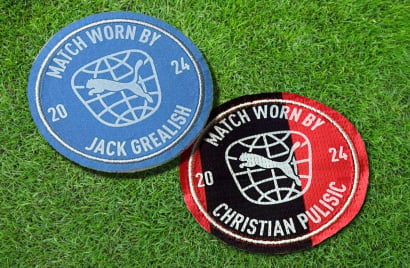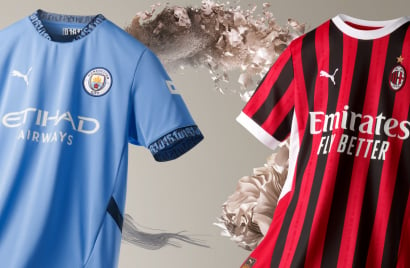
Supporting women through the messy middle of their careers
International Women’s Day may well be over, but progressive agency leaders remain focused on supporting women at every stage of their careers.

The sportswear brand is promoting a new textile recycling initiative through fashion, sustainability and football

Sportswear brand Puma is capitalising on 2024’s summer of sport to promote sustainable fashion through recycled football jerseys. The campaign celebrates Puma’s sustainability efforts and its textile recycling initiative and use of upcycled material entitled ‘Re-fibre’.
Under the program, the brand has produced millions of replica football jerseys that are made of at least 75% recycled textile and other waste materials. The brand is the latest to embrace the circular economy, underlining that sustainability and recycling materials is a lasting trend. Earlier in the year, Dr. Martens rolled out its new material made from leather offcuts, called ‘Genix Nappa’.
Puma is one of the latest in the fashion sphere to join the upcycling trend, but the brand has already been praised by Time Magazine for being one of the world’s Most Sustainable Companies in the world.
‘Re:fibre’ now features in the replica jerseys of 35 Puma football clubs, for the first time. In 2023, there were 46,000 jerseys made of the material which uses textile and other waste materials.
Efforts under the ‘Re:fibre’ initiative include trying to reduce reliance on plastic bottles for recycled polyester products. This involves the brand finding other ways to recycle polyester, like looking into thermo-mechanical and chemical recycling techniques. It is hoped that these methods will make it possible to upscale the output of more sustainable products.
To promote ‘Re:fibre’, Puma entered the world of experiential, using its flagship store in New York City to host various events. This included three upcycling workshops about extending the lifespan of clothes, from Andrew Burgess, an upcycler.
At the Fifth Avenue store, shoppers and football fans were also able to get their hands on badges made from kits worn during matches, as well as signed kits. These included kits worn by Jack Grealish and Christian Pulisic.
Burgess, Puma’s voice of a ‘Re:generation’, was responsible for creating the upcycled badges. 100 of these limited edition badges were available in store. The event coincided with the launch of two Puma football teams’ home replica kits: AC Milan and Manchester City, ahead of their match in New York City.
There were four key elements to the campaign: sustainability, innovation, exclusivity and engagement. The products were sustainable and the research into recycled material is the brand’s contribution to innovation. With a limited number of badges, Puma involved an element of exclusivity, and live events engaged attendees.
Anne-Laure Descours, Chief Sourcing Officer at Puma, explained: “Re:fibre gives football fans a tangible example of how Puma is working towards creating a Forever Better”.
She continued: “Our wish is to have 100% of our polyester products created from textile waste. Rethinking how we produce and moving towards a more circular business model is important and RE: FIBRE is central to that”.
Puma’s sustainability efforts with ‘Re:fibre’ pave the way for other brands to push out similar initiatives. The event in NYC promoted sustainable consumption to not just brands, but also to the public. Practising what it preaches, Puma took the opportunity to educate eco-friendly fashion enthusiasts, offering value beyond its products.
At the same time, the brand was able to involve a huge fan base in an important social issue - sustainability and consumption. Intertwining environmentally-conscious fashion with football, the ‘Re:fibre’ initiative encourages a large, mainstream consumer base to shop sustainably.


Looks like you need to create a Creativebrief account to perform this action.
Create account Sign inLooks like you need to create a Creativebrief account to perform this action.
Create account Sign in